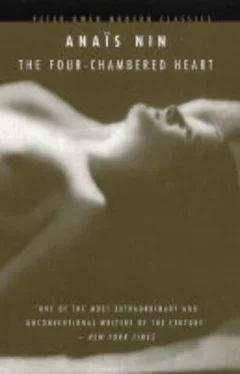Anaïs Nin - The Four-Chambered Heart
Здесь есть возможность читать онлайн «Anaïs Nin - The Four-Chambered Heart» весь текст электронной книги совершенно бесплатно (целиком полную версию без сокращений). В некоторых случаях можно слушать аудио, скачать через торрент в формате fb2 и присутствует краткое содержание. Год выпуска: 2004, ISBN: 2004, Издательство: Peter Owen Limited, Жанр: Классическая проза, Эротические любовные романы, на английском языке. Описание произведения, (предисловие) а так же отзывы посетителей доступны на портале библиотеки ЛибКат.
- Название:The Four-Chambered Heart
- Автор:
- Издательство:Peter Owen Limited
- Жанр:
- Год:2004
- ISBN:9780720611557
- Рейтинг книги:3 / 5. Голосов: 1
-
Избранное:Добавить в избранное
- Отзывы:
-
Ваша оценка:
- 60
- 1
- 2
- 3
- 4
- 5
The Four-Chambered Heart: краткое содержание, описание и аннотация
Предлагаем к чтению аннотацию, описание, краткое содержание или предисловие (зависит от того, что написал сам автор книги «The Four-Chambered Heart»). Если вы не нашли необходимую информацию о книге — напишите в комментариях, мы постараемся отыскать её.
The Four-Chambered Heart — читать онлайн бесплатно полную книгу (весь текст) целиком
Ниже представлен текст книги, разбитый по страницам. Система сохранения места последней прочитанной страницы, позволяет с удобством читать онлайн бесплатно книгу «The Four-Chambered Heart», без необходимости каждый раз заново искать на чём Вы остановились. Поставьте закладку, и сможете в любой момент перейти на страницу, на которой закончили чтение.
Интервал:
Закладка:
What had happened to this body made for the mountain, for violence and war? A little blue flame of music, of art, from the body of the aunt who had died playing Bach, a little blue flame of restless sulphur had passed into this body made for hunting, for war and the tournaments of love. It had lured him away from his birthplace, to the cities, to the cafes, to the artists.
But it had not made of him an artist.
It had been like a mirage, stealing him from other lives, depriving him of ranch, of luxury, of parents, of marriage and children, to make of him a nomad, a wanderer, a restless, homeless one who could never go home again: “Because I am ashamed, I have nothing to show, I would be coming back as a beggar.”
The little blue flame of music and poetry shone only at night, during the long nights of love, that was all. In the daytime it was invisible. As soon as day came, his body rose with such strength that she thought: he will conquer the world.
His body—which had not been chiseled like a city man’s, not with the precision and finesse of some highly finished statue, but modeled in a clay more massive, more formless too, cruder in outline, closer to primitive sculpture, as if it had kept a little of the heavier contours of the Indian, of animals, of rocks, earth, and plants.
His mother used to say: “You don’t kiss me like a boy, but like a little animal.”
He began his day slowly, like a cub, rubbing his eyes with closed fists, yawning with eyes closed, a humorous, a sly, upward wrinkle from mouth to high cheekbone, all his strength, as in the lion, hiden in a smooth form, no visible sign of effort.
He began his day slowly, as if man’s consciousness were something he had thrown off during the night, and had to be recovered like some artificial covering for his body.
In the city, this body made for violent movements, to leap, to face a danger of some kind, to match the stride of a horse, was useless. It had to be laid aside like a superfluous mantle. Firm muscles, nerves, instincts, animal quickness were useless. It was the head which must awaken, not the muscles and sinews. What must awaken was awareness of a different kind of danger, a different kind of effort, all of it to be considered, matched, mastered in the head, by some abstract wit and wisdom.
The physical euphoria was destroyed by the city. The supply of air and space was small. The lungs shrank. The blood thinned. The appetite was jaded and corrupt.
The vision, the splendor, the rhythm of the body were instantly broken. Clock time, machines, auto horns, whistles, congestion, caught man in their cogs, deafened, stupefied him. The city’s rhythm dictated to man; the imperious order to remain alive actually meant to become an abstraction.
Rango’s protest was to set out to deny and destroy the enemy. He set out to deny clock time and he would miss, first of all, all that he reached for. He would make such detours to obey his own rhythm and not the city’s that the simplest act of shaving and buying a steak would take hours, and the vitally important letter would never be written. If he passed a cigar store, his habit of counter-discipline would be stronger than his own needs and he would forget to buy the cigarettes he craved, but later when about to reach the house of a friend for lunch he would make a long detour for cigarettes and arrive too late for lunch, to find his angry friend gone, and thus once more the rhythm and pattern of the city were destroyed, the order broken, and Rango with it, Rango left without lunch.
He might try to reach the friend by going to the cafe, would find someone else and fall into talk about bookbinding and meanwhile another friend was waiting for Rango at the Guatemalan Embassy, waiting for his help, his introduction, and Rango never appeared, while Zora waited for him at the hospital, and Djuna waited for him in the barge, while the dinner she had made spoiled on the fire.
At this moment Rango was standing looking at a print on the bookstalls, or throwing dice over a cafe counter to gamble for a drink, and now that the city’s pattern had been destroyed, lay in shambles, he returned and said to Djuna: “I am tired.” And laid a despondent, a heavy head on her breasts, his heavy body on her bed, and all his unfulfilled desires, his aborted moments, lay downwith him like stones in his pockets, weighing him down, so that the bed creaked with the inertia of his words: “I wanted to do this, I wanted to do that, I want to change the world, I want to go and fight, I want…”
But it is night already, the day has fallen apart, disintegrated in his hands. Rango is tired, he will take another drink from the little barrel, eat a banana, and start to talk about his childhood, about the bread tree, the tree of the meadows that kill, the death of the little Negro boy his father had given him for his birthday, a little Negro boy who had been born the same day as Rango, but in the jungle, and who would be his companion on hunting trips, but who died almost immediately from the cold up in the mountains.
Thus at twilight when Rango had destroyed all order of the city because the city destroyed his body, and the day lay like a cemetery of negations, of rebellions and abortions, lay like a giant network in which he had tangled himself as a child tangles himself in an order he cannot understand, and is in danger of strangling himself…then Djuna, fearing he might suffocate, or be crushed, would tenderly seek to unwind him, just as she picked up the pieces of his broken glasses to have them made again…
They had reached a perfect moment of human love. They had created a moment of perfect understanding and accord. This highest moment would now remain as a point of comparison to torment them later on when all natural imperfections would disintegrate it.
The dislocations were at first subtle and held no warning of future destruction. At first the vision was clear, like a perfect crystal. Each act, each word would be imprinted on it to shed light and warmth on the growing roots of love, or to distort it slowly and corrode its expansion.
Rango lighting the lantern for her arrival, for her to see the red light from afar, to be reassured, incited to walk faster, elated by this symbol of his presence and his fervor. His preparing the fire to warm her… These rituals Rango could not sustain, for he could not maintain the effort to arrive on time since his lifelong habit had created the opposite habit: to elude, to avoid, to disappoint every expectation of others, every commitment, every promise, every crystallization.
The magic beauty of simultaneity, to see the loved one rushing toward you at the same moment you are rushing toward him, the magic power of meeting exactly at midnight to achieve union, the illusion of one common rhythm achieved by overcoming obstacles, deserting friends, breaking other bonds—all this was soon dissolved by his laziness, by his habit of missing every moment, of never keeping his word, of living perversely in a state of chaos, of swimming more naturally in a sea of failed intentions, broken promises, and aborted wishes.
The importance of rhythm in Djuna was so strong that no matter where she was, even without a watch, she sensed the approach of midnight and would climb on a bus, so instinctively accurate that very often as she stepped off the bus the twelve loud gongs of midnight would be striking at the large station clock.
This obedience to timing was her awareness of the rarity of unity between human beings. She was fully, painfully aware that very rarely did midnight strike in two hearts at once, very rarely did midnight arouse two equal desires, and that any dislocation in this, any indifference, was an indication of disunity, of the difficulties, the impossibilities of fusion between human beings.
Читать дальшеИнтервал:
Закладка:
Похожие книги на «The Four-Chambered Heart»
Представляем Вашему вниманию похожие книги на «The Four-Chambered Heart» списком для выбора. Мы отобрали схожую по названию и смыслу литературу в надежде предоставить читателям больше вариантов отыскать новые, интересные, ещё непрочитанные произведения.
Обсуждение, отзывы о книге «The Four-Chambered Heart» и просто собственные мнения читателей. Оставьте ваши комментарии, напишите, что Вы думаете о произведении, его смысле или главных героях. Укажите что конкретно понравилось, а что нет, и почему Вы так считаете.












